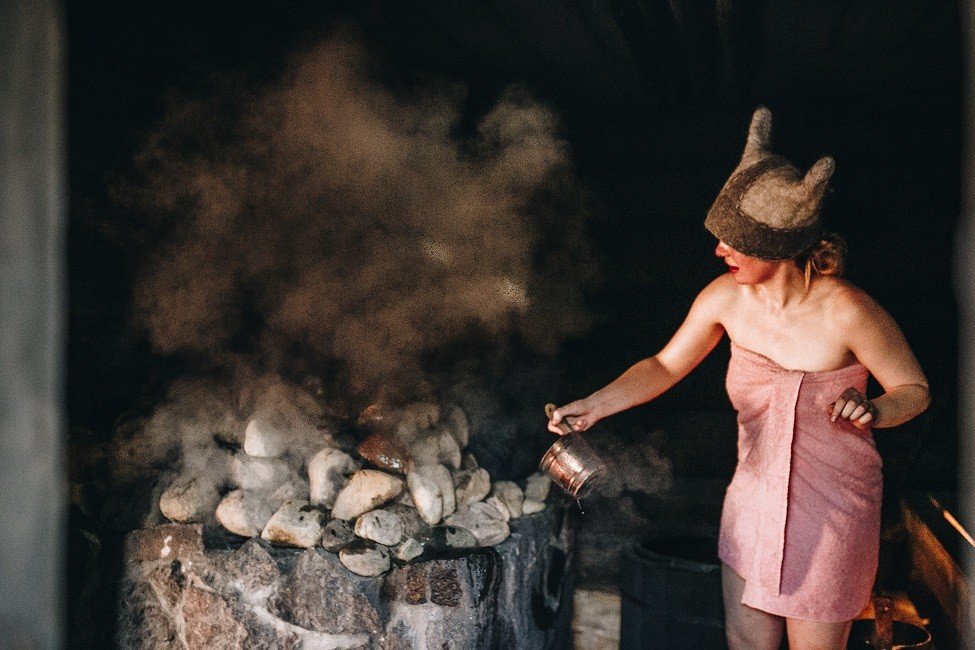This review contains mentions of abuse and sexual assault
Smoke Sauna Sisterhood screens at Perth’s Revelation Film Festival on July 12, 14 and 15.
“For my sisters”
Anna Hints’ beguiling documentary Smoke Sauna Sisterhood is a profound communion between women who share a small space in a smoke sauna in the Võro community of Estonia. The smoke sauna is a place of ritual cleansing and protection, a sanctuary where women can speak of their experiences and heal spiritually and psychologically as they slough away dead skin and experience a kind of rebirth. The sauna is sacred and listed by UNESCO as part of the Intangible Cultural Heritage of Humanity, a category that also includes Tibetan opera and Chinese calligraphy – a think that is ineffable but somehow captures the human spirit.
The human spirit is what Hints’ profound documentary attempts to grasp. Something that is present and abundant, but also something that has been stymied by patriarchal society for the women who gather over a few seasons in the sauna. Women of all body shapes, ages, and sexualities, exist naked in the room. Sweat pours from their bodies and words pour from their mouths. Secrets that are shared to exorcise shame and to build community. The women are naked, not nude in the polite parlance of art, naked and raw and closely observed by Ants Tamik’s cinematography which is never used to exploit but to give the sense that although the bodies are discrete entities, they are also one body.
Some women are shown in full, others are shadowed, some obscured. What is never obscured is their stories and experiences. Some are light-hearted like discussing dick pics and dating apps. Others delve into their confused body image that was passed down to them by their mothers who defined themselves through the male gaze. Hints does not allow the male gaze at all – not as a visual tool, and not as something that is valorised. In fact, as stories are told we see women who have suffered enormous abuse. Domestic violence, the pressure to only have female children, the inability to leave a man despite his abusive behaviour. Yet, the women who gather are cleansing themselves of these patriarchal shadows and bidding goodbye to a world where they are disempowered.
The stories that are told in some part are for the sake of building a sense of community between them. Admitting to having abortions or not wanting to be a mother. Admitting their sexuality or sexual confusion. Finding others who share their experiences. While these conversations go on the women scrub their bodies, pour water over their heads, drink in the heat and let it come out of their pores. They sing, they chant, they bless each other. For as much trauma that is revealed there is also a sense of joy and freedom that is shown especially as they exit the small cabin and frolic naked in the grass or float in the stream.
The documentary is as intimate as can be imagined, so intimate that we sometimes forget that there are individuals, just a close-up of a collective. The experiences are generally so universal and relatable that when one experience stands out against the collective it does so in a manner that will still reverberate with members of the audience. A woman describes having to give birth to her daughter who died in the womb. She discusses the birth process in a way that many mothers have understood it, but when it comes time to holding her dead baby, that experience is hers, but in sharing it becomes something that that she can gradually heal from.
An older woman superimposed on tendrils of smoke tells the stories of the women who came before – the women who had to live in ignorance and shame because no one would speak to them about their bodies. Younger women talk about their family doing everything they can to avoid talking about feelings. They laugh ironically about the terms they use for their vaginas. They talk about bodies that have been damaged by illness. Bodies that are imperfect but always beautiful.
Hints allows a woman in a single take to tell the story of her brutal rape where she believed she was going to die. Originally it was a discussion about how virginity is prized above all else, but as the woman speaks of her descent into a hellish twenty-four hours where she is not only raped at knife point but then assaulted a second time by someone purporting to save her, she relates that the “precious thing” that was virginity is nowhere near as precious as her life. The women sit in silence with her, one gently stroking her hair. “How can I protect my daughters from this?” she wails. The blessings of the sauna might not protect the women, but they do allow them somewhere to be heard and acknowledged.
Hints’ documentary is spectacularly visually beautiful and complemented by a series of folksongs and compositions written and performed by Hints and others. There is something of the sacred feminine to the work – a term that is slippery to give a definition to but is recognisably present. The women bless a baby with the chant “Become powerful.” The power is in recognising the past and how it has oppressed women, including the women who visit the sauna, and then turning away from it with a newly fortified soul.
Smoke Sauna Sisterhood is at times difficult – for catharsis the road through trauma must be taken. The tales are dark as well as light, and sometimes the darkness seems overwhelming and the sauna too small to contain such pain. However, it is not the sauna that is absorbing the pain but the women in it who share it and then expel it. What Anna Hints observes, and records is in its own way momentous. It might seem like a group of women coming together in a remote place, but it is more than that. It is the expulsion of shame, the rejection of oppressive strictures, and the support of women who realise they have sat in judgement of themselves as they listen to others without judgement. The tendrils of smoke that fill the sauna are the tendrils of hope and liberty – they are healing and rebirth.
Director: Anna Hints
Writer: Anna Hints



